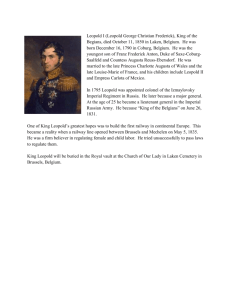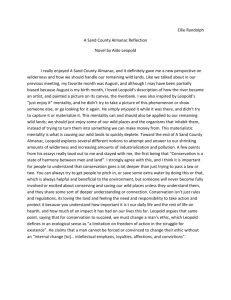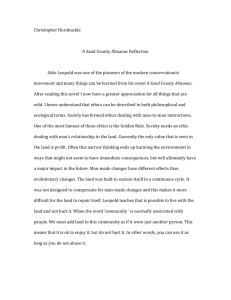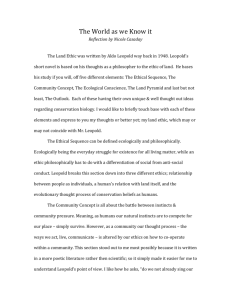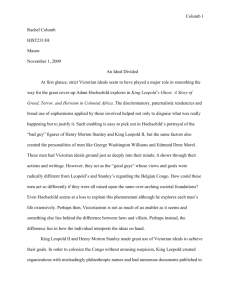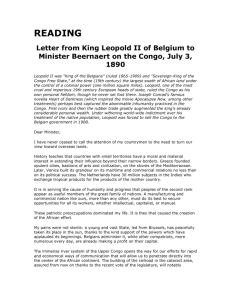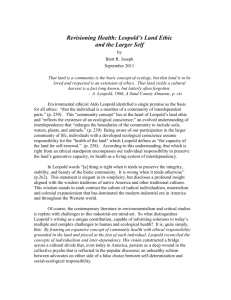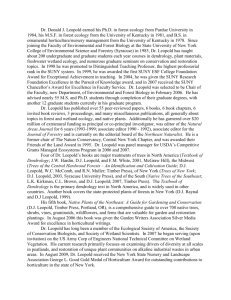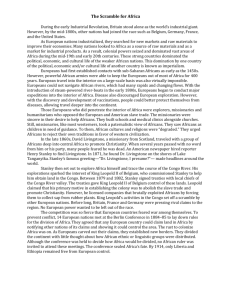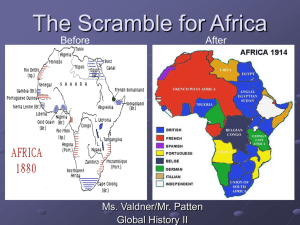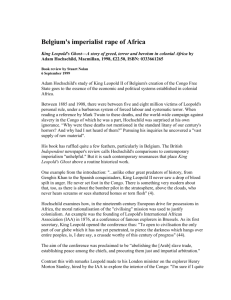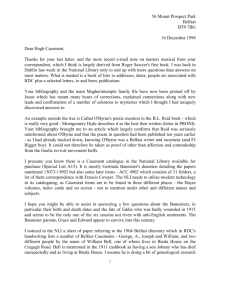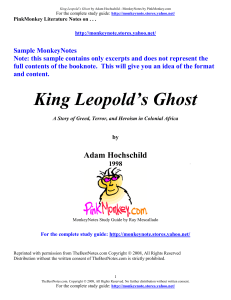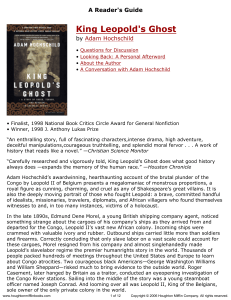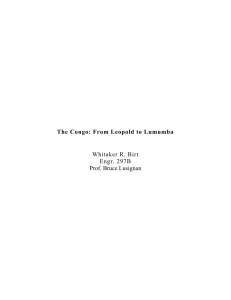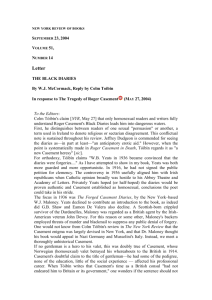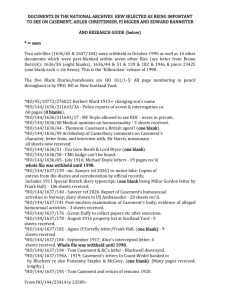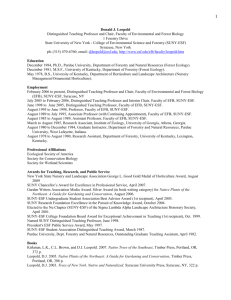King Leopold`s Ghost
advertisement
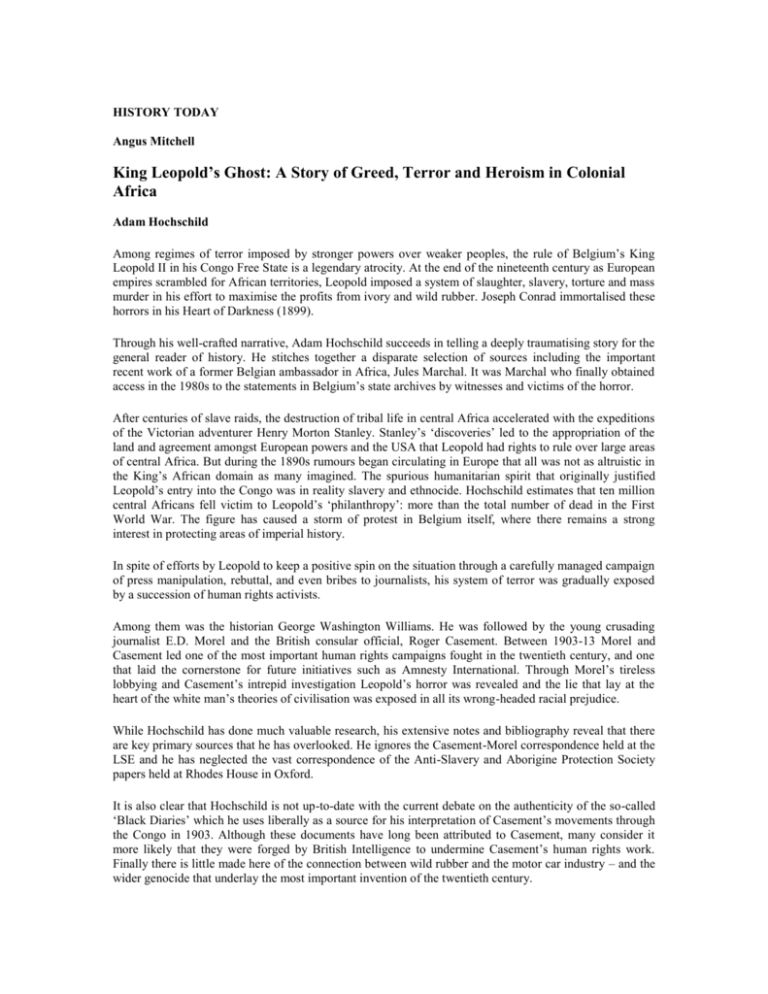
HISTORY TODAY Angus Mitchell King Leopold’s Ghost: A Story of Greed, Terror and Heroism in Colonial Africa Adam Hochschild Among regimes of terror imposed by stronger powers over weaker peoples, the rule of Belgium’s King Leopold II in his Congo Free State is a legendary atrocity. At the end of the nineteenth century as European empires scrambled for African territories, Leopold imposed a system of slaughter, slavery, torture and mass murder in his effort to maximise the profits from ivory and wild rubber. Joseph Conrad immortalised these horrors in his Heart of Darkness (1899). Through his well-crafted narrative, Adam Hochschild succeeds in telling a deeply traumatising story for the general reader of history. He stitches together a disparate selection of sources including the important recent work of a former Belgian ambassador in Africa, Jules Marchal. It was Marchal who finally obtained access in the 1980s to the statements in Belgium’s state archives by witnesses and victims of the horror. After centuries of slave raids, the destruction of tribal life in central Africa accelerated with the expeditions of the Victorian adventurer Henry Morton Stanley. Stanley’s ‘discoveries’ led to the appropriation of the land and agreement amongst European powers and the USA that Leopold had rights to rule over large areas of central Africa. But during the 1890s rumours began circulating in Europe that all was not as altruistic in the King’s African domain as many imagined. The spurious humanitarian spirit that originally justified Leopold’s entry into the Congo was in reality slavery and ethnocide. Hochschild estimates that ten million central Africans fell victim to Leopold’s ‘philanthropy’: more than the total number of dead in the First World War. The figure has caused a storm of protest in Belgium itself, where there remains a strong interest in protecting areas of imperial history. In spite of efforts by Leopold to keep a positive spin on the situation through a carefully managed campaign of press manipulation, rebuttal, and even bribes to journalists, his system of terror was gradually exposed by a succession of human rights activists. Among them was the historian George Washington Williams. He was followed by the young crusading journalist E.D. Morel and the British consular official, Roger Casement. Between 1903-13 Morel and Casement led one of the most important human rights campaigns fought in the twentieth century, and one that laid the cornerstone for future initiatives such as Amnesty International. Through Morel’s tireless lobbying and Casement’s intrepid investigation Leopold’s horror was revealed and the lie that lay at the heart of the white man’s theories of civilisation was exposed in all its wrong-headed racial prejudice. While Hochschild has done much valuable research, his extensive notes and bibliography reveal that there are key primary sources that he has overlooked. He ignores the Casement-Morel correspondence held at the LSE and he has neglected the vast correspondence of the Anti-Slavery and Aborigine Protection Society papers held at Rhodes House in Oxford. It is also clear that Hochschild is not up-to-date with the current debate on the authenticity of the so-called ‘Black Diaries’ which he uses liberally as a source for his interpretation of Casement’s movements through the Congo in 1903. Although these documents have long been attributed to Casement, many consider it more likely that they were forged by British Intelligence to undermine Casement’s human rights work. Finally there is little made here of the connection between wild rubber and the motor car industry – and the wider genocide that underlay the most important invention of the twentieth century. The image of empire was built upon myths and myth-making. Stanley wove a web of lies to support the ‘civilising’ of central Africa. Likewise, Leopold understood the power of propaganda. Hochschild’s book certainly contributes to a clearer understanding of a highly complex moment in African history, but it is a long way from the definitive work required of this terrifying episode. Angus Mitchell is the editor of The Amazon Journal of Roger Casement (Anaconda Press, 1997) King Leopold’s Ghost: A Story of Greed, Terror and Heroism in Colonial Africa Macmillan £22.50 366pp ISBN 0-333-66126-5
